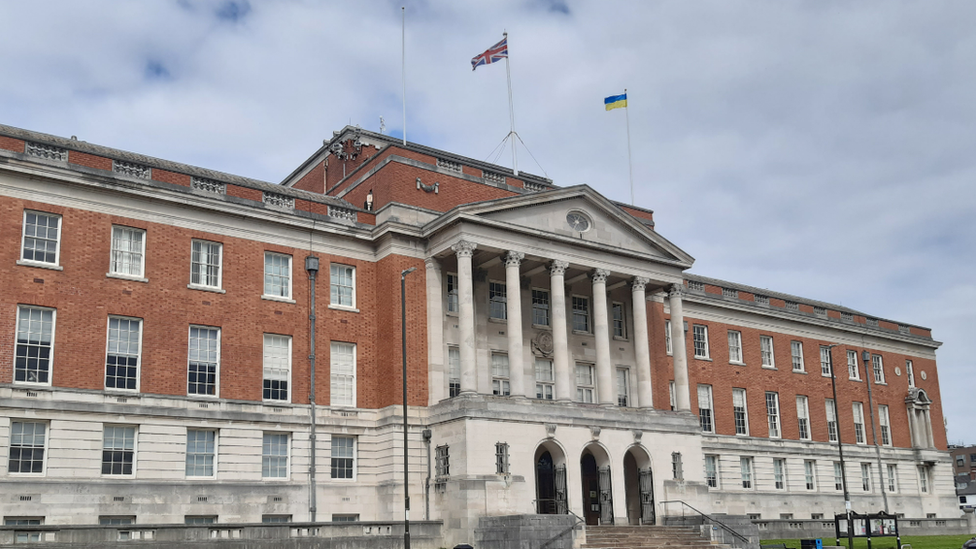Chesterfield Borough Council jobs and services in danger, authority warns
- Published

Chesterfield Borough Council is suffering from funding gaps
Jobs are at risk and services could be reduced at a council facing multi-million-pound budget shortfalls, the authority has warned.
Labour-controlled Chesterfield Borough Council is suffering from funding gaps due to the Covid-19 pandemic, cost of living crisis and high inflation.
Liberal Democrat Paul Holmes told the council it had "made the overspend worse by hiring extra staff".
Deputy leader Amanda Serjeant confirmed some jobs would be lost.
The council's budget shortfalls currently stand at £2.5m for 2024/25, rising to £3.4m in 2026/27.
Mr Holmes said the council's Budget Strategy Report stated what was left in reserves could not cover the deficits, and efficiency savings would not save £2.5m in the next year.
He said the report stated staff reductions would be required, including 30 expected voluntary redundancies, and that the council may have to stop delivering some non-statutory services altogether.
'Residents will suffer'
He told the council meeting: "If you had made planned savings over the last four years, the problem would be much less now. Instead, you have waited until the council has fallen over a financial cliff edge.
"Now you have to make sudden and deep cuts. This was not prudent, it was irresponsible. Chesterfield residents will suffer as a result."
Ms Serjeant, who is also cabinet member for finance and asset management, said: "We are going to have to reduce the size of the council's workforce, which is why we have recently launched a corporate voluntary redundancy and voluntary early retirement scheme in agreement with the trade unions.
"Our aim in the next six months is to right size the organisation for the future, deliver budget savings and avoid the need for compulsory redundancies.
"Inevitably, such measures will have consequences in relation to our ability to continue to deliver all of the council's services to the same levels and standards. This might mean stopping the delivery of some services and, or reducing how much we deliver of others."
The council claims that reduced rental income from the Pavements Shopping Centre, empty retail units in the town centre, and reduced income from car parks has also had an impact, according to the Local Democracy Reporting Service.
Other factors, including lower income levels at the markets, planning application delays and reduction in council housing rental income also played a part, it said.
The authority said it planned to address financial pressures, protect essential services and meet increasing demands to help the vulnerable, claiming it had made "significant savings" over many years.

Follow BBC East Midlands on Facebook, external, on Twitter, external, or on Instagram, external. Send your story ideas to eastmidsnews@bbc.co.uk, external.
Related topics
- Published29 August 2023

- Published23 February 2023
